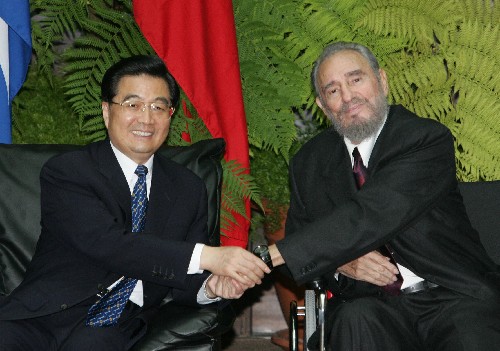“For China, Fidel Castro has a special position in many peoples’ hearts,” Chinese state media wrote on November 26, the day that the news about the passing of the Cuban revolutionary leader became trending on social media all across the world.
The generally positive Chinese public view on Castro was apparent on social media on November 26, as many netizens lit digital candles and shared pictures of Castro.
On China’s Sina Weibo, Fidel Castro (Fēidé’ěr Kǎsītèluō 菲德尔.卡斯特罗 in Chinese) became the top trending topic of the day under the hashtag “Castro passes away” (#卡斯特罗去世#). The topic that was soon viewed 60 million times.
“Old friend of the people of China, rest in peace,” one commenter said.
“Castro is immortal for resisting American hegemony,” another Weibo user commented.
One netizen (@斗歌先生见您笑, 1986) wrote: “I once said about the great Kim Jong Il: when I was in kindergarten, he was chairman; throughout primary school, he was chairman; when I went to high school, he was chairman; during my college years, he was chairman; when I got my first job, he was chairman; I got married, he was chairman; when my son was born, he was still the chairman; when my son went to school, he was chairman … I finally understand that for communist leaders the ‘the struggle for communism’ really lasts a lifetime.”
Under the leadership of Castro, Cuba became the first country in Latin American to establish diplomatic relations with China. China’s former president Hu Jintao described China-Cuba relations as those between “good comrades, good friends, and brothers” (Creutzfeldt 2016)

“I do not know much about the life of Castro,” one Weibo user wrote: “But I do know he believed in communism and supported it, and that he was a great communist. He stayed true to his ideals, and perhaps we lack that kind of perseverance. Rest in peace, Castro! You may have left this world, but you are already immortal.”
One other person commented: “It seems that China’s old friends are slowly all disappearing (..). I now feel the pain of the fox that’s grieving over the dead rabbit [Chinese saying 兔死狐悲 Tùsǐ húbēi: to have sympathy with a like-minded person in distress].”
Although the majority of netizens show strong favoritism of Castro, there are also those who are more critical. One micro-blogger described Castro as “evil” and a “failed leader” for causing suffering in Cuba and prosecuting many people to death. At the time of writing, the post was not censored.
Most Chinese netizens will not remember Castro as an “evil” leader, but as an old friend of China who stayed true to his communist ideals.
“Great communist soldier, our comrade Castro will never be forgotten!”, one netizen writes.
– By Manya Koetse
Follow on Twitter or Like on Facebook
Sources/References
Creutzfeldt, Benjamin. 2016. “One Actor, Many Agents: China’s Latin America Policy in Theory and Practice.” In Margaret Myers and Carol Wise (ed), The Political Economy of China-Latin America Relations in the New Millennium. London & New York: Routledge.
©2016 Whatsonweibo. All rights reserved. Do not reproduce our content without permission – you can contact us at info@whatsonweibo.com.
The post “RIP, Friend of China” – Chinese Netizens Light Virtual Candles for ‘Comrade’ Castro appeared first on What's on Weibo.